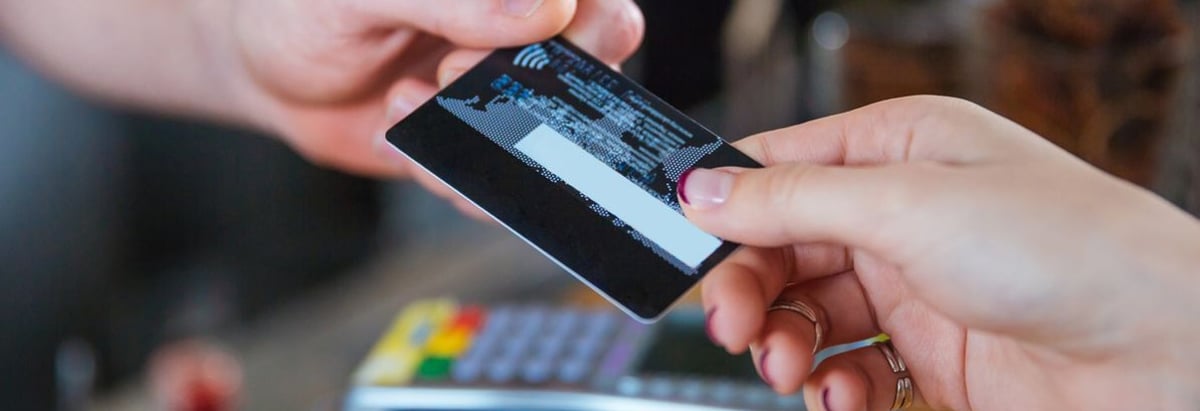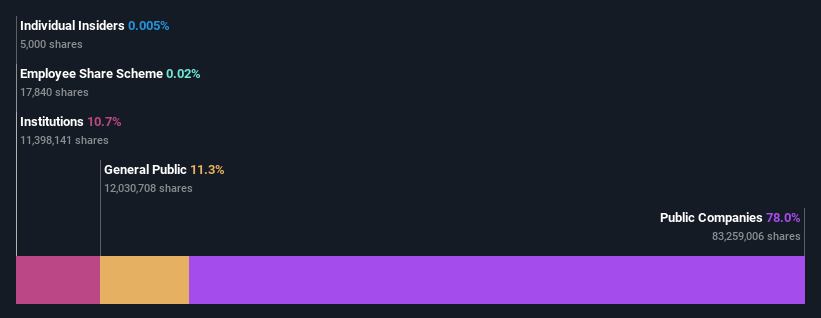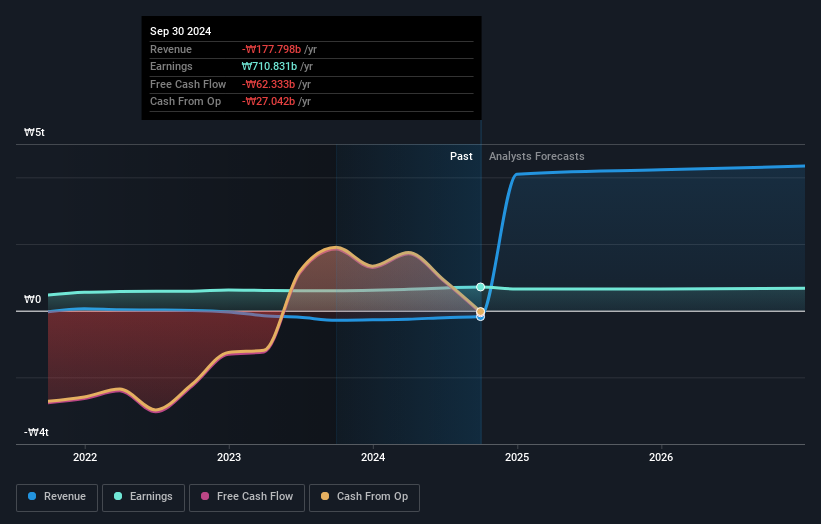- South Korea
- /
- Consumer Finance
- /
- KOSE:A029780
Samsung Card Co., Ltd.'s (KRX:029780) biggest owners are public companies who got richer after stock soared 3.9% last week

Key Insights
- Samsung Card's significant public companies ownership suggests that the key decisions are influenced by shareholders from the larger public
- 78% of the company is held by a single shareholder (Samsung Life Insurance Co., Ltd.)
- Institutional ownership in Samsung Card is 11%
If you want to know who really controls Samsung Card Co., Ltd. (KRX:029780), then you'll have to look at the makeup of its share registry. We can see that public companies own the lion's share in the company with 78% ownership. In other words, the group stands to gain the most (or lose the most) from their investment into the company.
As a result, public companies collectively scored the highest last week as the company hit ₩4.3t market cap following a 3.9% gain in the stock.
Let's delve deeper into each type of owner of Samsung Card, beginning with the chart below.
View our latest analysis for Samsung Card

What Does The Institutional Ownership Tell Us About Samsung Card?
Many institutions measure their performance against an index that approximates the local market. So they usually pay more attention to companies that are included in major indices.
Samsung Card already has institutions on the share registry. Indeed, they own a respectable stake in the company. This suggests some credibility amongst professional investors. But we can't rely on that fact alone since institutions make bad investments sometimes, just like everyone does. It is not uncommon to see a big share price drop if two large institutional investors try to sell out of a stock at the same time. So it is worth checking the past earnings trajectory of Samsung Card, (below). Of course, keep in mind that there are other factors to consider, too.

Samsung Card is not owned by hedge funds. Samsung Life Insurance Co., Ltd. is currently the company's largest shareholder with 78% of shares outstanding. This essentially means that they have extensive influence, if not outright control, over the future of the corporation. National Pension Service is the second largest shareholder owning 6.5% of common stock, and The Vanguard Group, Inc. holds about 1.0% of the company stock.
Researching institutional ownership is a good way to gauge and filter a stock's expected performance. The same can be achieved by studying analyst sentiments. Quite a few analysts cover the stock, so you could look into forecast growth quite easily.
Insider Ownership Of Samsung Card
The definition of an insider can differ slightly between different countries, but members of the board of directors always count. Management ultimately answers to the board. However, it is not uncommon for managers to be executive board members, especially if they are a founder or the CEO.
Insider ownership is positive when it signals leadership are thinking like the true owners of the company. However, high insider ownership can also give immense power to a small group within the company. This can be negative in some circumstances.
Our information suggests that Samsung Card Co., Ltd. insiders own under 1% of the company. It's a big company, so even a small proportional interest can create alignment between the board and shareholders. In this case insiders own ₩200m worth of shares. It is always good to see at least some insider ownership, but it might be worth checking if those insiders have been selling.
General Public Ownership
With a 11% ownership, the general public, mostly comprising of individual investors, have some degree of sway over Samsung Card. While this size of ownership may not be enough to sway a policy decision in their favour, they can still make a collective impact on company policies.
Public Company Ownership
We can see that public companies hold 78% of the Samsung Card shares on issue. This may be a strategic interest and the two companies may have related business interests. It could be that they have de-merged. This holding is probably worth investigating further.
Next Steps:
I find it very interesting to look at who exactly owns a company. But to truly gain insight, we need to consider other information, too. Be aware that Samsung Card is showing 5 warning signs in our investment analysis , and 3 of those are a bit concerning...
But ultimately it is the future, not the past, that will determine how well the owners of this business will do. Therefore we think it advisable to take a look at this free report showing whether analysts are predicting a brighter future.
NB: Figures in this article are calculated using data from the last twelve months, which refer to the 12-month period ending on the last date of the month the financial statement is dated. This may not be consistent with full year annual report figures.
New: Manage All Your Stock Portfolios in One Place
We've created the ultimate portfolio companion for stock investors, and it's free.
• Connect an unlimited number of Portfolios and see your total in one currency
• Be alerted to new Warning Signs or Risks via email or mobile
• Track the Fair Value of your stocks
Have feedback on this article? Concerned about the content? Get in touch with us directly. Alternatively, email editorial-team (at) simplywallst.com.
This article by Simply Wall St is general in nature. We provide commentary based on historical data and analyst forecasts only using an unbiased methodology and our articles are not intended to be financial advice. It does not constitute a recommendation to buy or sell any stock, and does not take account of your objectives, or your financial situation. We aim to bring you long-term focused analysis driven by fundamental data. Note that our analysis may not factor in the latest price-sensitive company announcements or qualitative material. Simply Wall St has no position in any stocks mentioned.
About KOSE:A029780
Undervalued moderate.

